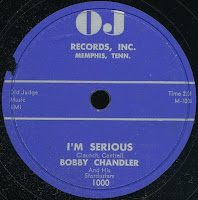Stanley Augustus Kesler was born on August 11, 1928, in Abbeville, Mississippi. It became evident in his early years that Kesler was a talented musician, as he learned to play mandolin and guitar as a child. He joined the US Marines in the 1940s and it was during this time that he mastered also the steel guitar. After his discharge in 1946, he began working with a couple of country bands. First he performed with an outfit that also included his brothers, then joining Al Rodgers' combo in Amarillo, Texas.
 |
| Stan Kesler |
The Flip single had brought Kesler to the attention of Sam Phillips and he began working for Phillips as a musician, songwriter, and engineer. Elvis Presley recorded Kesler's "I'm Left, You're Right, She's Gone" (co-written with Bill Taylor) and "I Forgot to Remember to Forget" (co-written with Charlie Feathers) in 1955 for Sun. Kesler also played on many country Sun recordings during this time. In late 1956, Kesler learned to play bass, which eventually became his main instrument.
After leaving his mark at Sun, Kesler set out on his own in late 1957 and went into partnership with Eugene Lucchesi and Drew Canale. They founded Crystal Records with Kesler running essentially the label in creative terms, while Lucchesi and Canale mainly served as investors. The first single was by Jean Kelly, "Someone to Love" b/w "I Keep Forgetting" (Crystal #500), released in either late 1957 or early 1958. Kelly was born in 1935 in Braden, Texas.
Next up was Don Hosea, who also recorded for Sun and for Billy Lee Riley's Rita label. Hosea recorded "Everlasting Love" for Crystal, which was later that year recorded by Barbara Pittman for Phillips International. Originally hailing from Cape Girardeau, Missouri, Hosea spent much of the 1950s and 1960s in Memphis, performing with the Snearly Ranch Boys and the Bill Black Combo. He left for Nashville in 1967, where he found work as a songwriter.
Jimmy Knight with "You'll Always Be Mine" b/w "Hula Bop" (Crystal #502) had another interesting disc on Crystal. Knight was also a member of the Snearly Ranch Boys at the time of this release and sang with Kesler's vocal group "The Sunrays." The Stan Kesler-Bill Taylor written "Hula Bop" was likely one of the band's standards, as it had been recorded three years earlier by Snearly Ranch Boy Smokey Joe Baugh for Sun with the band providing the backing.
Crystal #503 was by James Edward "Jimmy" Pritchett, another of Kesler's discoveries. Kesler rented studio time at radio WHBQ to record the Ramon Maupin penned "Nothing on My Mind" and the stunning "That's the Way I Feel" with Pritchett but Kesler ran into problems with the equipment at the studio. Therefore, he instead used Sam Phillips' Sun studio. Sources often credit the Snearly Ranch Boys playing on this record but actually the background band sounds more like Sun's rockabilly staff of Roland Janes (guitar) and Jimmy Van Eaton (drums). May it as it be, the single made some noise around Memphis but finally shared the fate of its presecurors and went nowhere. Pritchtett, who hailed from Osceola, Arkansas, where he was born on March 26, 1935, died in Memphis on July 13, 1982.
According to Kesler, there were a couple of other releases on Crystal, which have yet to be located, however. Kesler became dissatisfied with his partner Canale and recalled: "Canale put in a thousand dollars and expected back 10,000 next week [...]. Me and Drew wouldn't work." In the end, Crystal was shut down and in 1959, Kesler began a new project with Clyde Leoppard and Jack Clement, opening their own recording studio for a short time.
Kesler later established the Echo Recording Studio on Manassas Avenue and ran the Pen and XL labels. Under his supervision, a couple of big pop hits were produced in Memphis during the 1960s and 1970s. He eventually returned to Sun and engineered sessions there well into the 2000s. Stan Kesler died in 2020.




























